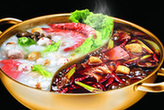Like other female villagers, she stores the water in a pot and boils it before washing her hair so the water ferments.
She then rinses her hair with spring waters "which is cool in summer and warm in winter." Then she wrings it and puts it up on her head to dry.
"My long hair is always noticed when I go outside the village," 27-year-old Pan Yongyan says. "It's inconvenient when I take the train or bus, because it's uncomfortable to sit for a long time with the big bun and inconvenient to comb my hair when I wake up on a sleeper berth."
Young Hongyao women wear headscarves before marriage. |
She works in the village's singing and dancing performance group and displays her long hair for tourists, earning about 2,000 yuan ($318) a month in the peak season of tourism and 1,000 yuan in the off-season. She performs six or seven 40-minute shows per day at most.
In January 2009, she went to Beijing to become an assistant to actress Huang Shengyi for four months. There, she used shampoo to wash her hair. She had to get up early or go to bed late to wash and dry it.
"I felt like a stranger in the city and was lonely. The pace of life there was too fast," she says.
She says she prefers to be at home because she can be with her family and the money she earned in Beijing is about the same as she earns in her village.
"When I was a kid, I was depressed about my long hair because my classmates would discuss it all the time. But I started to cherish it gradually," she says.
Besides performing, she also waitresses in her family's restaurant, does housework and makes embroidery.
"It takes three years to embroider a Yao-style outfit. It's for my dowry, and my mother helps do the needlework," Pan Yongyan says.
"The tourism boom has changed our lives greatly. We used to sing a folk song saying that Huangluo was the poorest village, but now we are living a pretty good life."
They live in diaojiaolou, houses typical of several Chinese ethnic groups, including the Dong and Miao. They keep cattle and pigs on the first floor, live on the second floor and store goods on the third floor.
Pan Hongmei says these days, however, for hygiene reasons, domestic animals are kept in another building.
"Some people build brick buildings, but I prefer wooden diaojiaolou because I want my offspring to inherit our traditions. My 4-month-old granddaughter will wear her hair long, too."
By Xu Lin




Why not rent a boyfriend, or girlfriend to please parents during the Spring Festival?